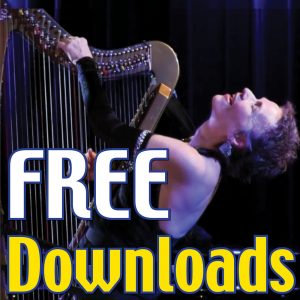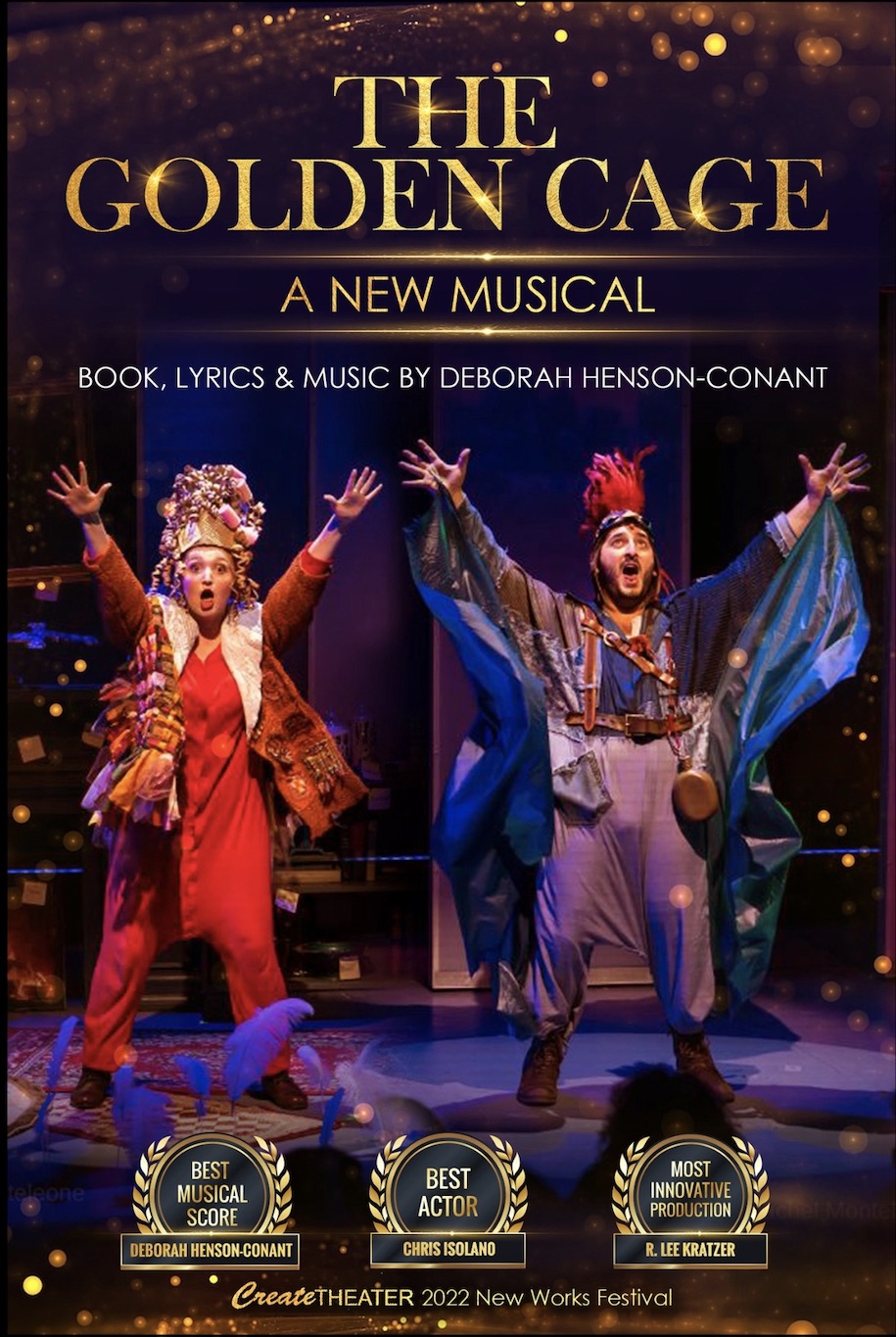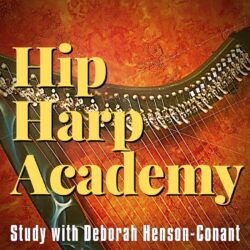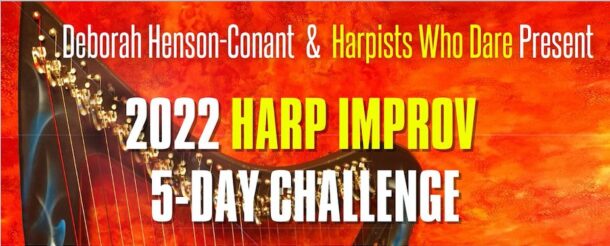Welcome to a one-on-one interview with Grammy-nominated harpist Deborah Henson-Conant, the mastermind behind “Hip Harp Academy” – an online academy where harp enthusiasts come together to learn, inspire, and grow in their musical journey.
In this exclusive interview, Deborah explains what it looks like to be part of the classes of Hip Harp Academy – from the different quarters to the weekly ‘chats’ and ‘office hours’.
Check out Deborah’s answer to the question: What does a typical class look like in the Hip Harp Academy?
Watch the video above or read the transcript of the interview below.
What does a typical class look like in the Hip Harp Academy?
SUMMARY OF THE VIDEO
THE CURRICULUM
The Hip Harp Academy’s curriculum is divided into four quarters, each focusing on a different aspect of music and creativity. The first quarter, “Strings of Passion,” explores principles guiding creative expression. The second, “Grounded Expansion,” emphasizes grounding techniques like Rondo forms to facilitate improvisation. The third, “The Power of Pattern,” delves into blues music and its repetitive structures. The final quarter, “Structure is Freedom,” teaches a universal compositional structure applicable across various musical genres.
WEEKLY SESSIONS
Weekly sessions, termed “Learning Labs,” involve interactive teaching, sharing of videos by members, and constructive feedback in a supportive environment. Additionally, there are classes, catch-up coaching sessions, and office hours for personalized learning. Special workshops and projects, like the Ambient Improv Exploration Project, offer diverse learning experiences tailored to members’ interests and goals. The academy accommodates various learning styles, encouraging exploration and growth within a vibrant community of musicians.
Full Transcript of the Video (above)
What does a typical class look like in the Hip Harp Academy?
So first of all, we do the academy in quarters, and there are four quarters. And there’s a foundational way of thinking in each quarter, but it’s real, really all focusing towards being grounded and being able to expand from being grounded.
So the very first quarter of the year is called Strings of Passion. And it’s the seven principles that take you from creative impulse to creative expression.
The second quarter of the year is called Grounded Expansion. And it focuses on different ways of grounding, meet, literally musically grounding, so that you can expand like there are actual musical structures that have been used since Mozart. And before that, specifically grounded, they’re called Rondo forms. And they’re where you play a melody and then you expand go away, and then you come back and you play that melody and you go away. And they are a really powerful, great form. Especially when you’re first learning to improvise.
That’s how I first learned to improvise. And I learned on a piece called which I now called Baroque Flamenco, but it was a little minuet by John Rocker. So that had a melody … [Deborah plays the harp] … So that was this beautiful melody I could ground in and that I loved. And then I discovered, again, because I’m a composer, I discovered that the alternate to this little melody had what was called a descending baseline … [Deborah plays the harp] … It just had this structure. And I found that if I played that baseline, I could improvise … [Deborah plays the harp] … And since I was doing this, when I was first learning, I would do that until I got lost, and then it would come back and play the melody again. … [Deborah plays the harp] … And then I would take another adventure, I try it again. And I kept using this piece my whole life until it became this sort of iconic piece, when I kept, I kept taking this secondary part, I started, I started adding other things to it, I started adding rhythms, but always coming back to this grounding place. So that piece is the epitome. Well, not the pieces are a great example of the idea of grounded expansion. And that’s what we base the second quarter on doesn’t have to be that piece, you you kind of get the sense with that piece. But then you realize you can do this with any piece of music, you can use it with any piece you already have you grounded in what you already are comfortable with, you expand into improvisation, you come back and ground in what you’re comfortable in, and then you expand. So that’s the second quarter.
The third quarter is called the Power of Pattern. And that quarter, we focus on blues, because blues is a really powerful form for having a pattern, it has a 12 bar pattern, which I’m not going to go into right now. But it also has this really great scale that allow and it’s got a beautiful pattern because your two hands do the same thing. And when you do that as you add styling to it, you can use the power of that pattern to once again, ground you so then you can expand. And in that quarter we also learn really cool things like how you can use the the, you know the capabilities of the harp to get more self expression. Now, not everybody wants to do the blues, there are many people in the academy who are only playing therapeutic music, but they can still use the power of pattern and even the power of blues. Like here’s another example that’s still using the same patterns Believe it or not as the other one and that can be done and even slow down even more to be used in a therapeutic setting. So that quarter, the power of pattern opens up the power of pattern, that’s why it’s called that.
And then the last quarter of the year is called Structure is Freedom. Now, every single one of the quarters has a compositional structure in it. Like the blues is a compositional structure, like the Rondo is a compositional structure. And in the quarter structure is freedom, we use a structure that is really amazing because it exists. Through Time, I noticed it when I was back, I was studying Mozart and I was studying, you know, Beethoven, then I was studying jazz, and I was like, wait a minute, there’s a structure at the heart of every one of these, that is almost exactly the same. And so I distilled it. And that’s what I teach that quarter and, and what happens as you go through the four quarters is that it starts developing your repertoire, because each one of these structures, and what you’re learning in the quarter opens up not a single piece of music, but it opens up a type of creating music, which could open up composition to you if that’s where you wanted to go. But I’m teaching improvisation. So it opens up improvisation. So through the year, and this is why there are so many people in the academy who have been there for years and years.
Because the first quarter the first time through, you’re just like, Oh, I’m just kind of holding on and you’re learning it and you build your repertoire a little bit. Second time you build it more. And by the third or fourth time you go. And some people do this the first time you start to realize, wait a minute, I can use this in everything. I could build a whole repertoire from this. And I had someone just say to me the other day, she said, I just improvised for two hours. And it was glorious. And it was such a wonderful thing to hear that all these things that I discovered through my lifetime that I’m able to share them in the academy so that other people can start expressing themselves with these structures, these patterns this grounded expansions, these ideas.
That is that is I mean, that is so exciting. I every day when I get done with a chat, you know, every week we have a chat. A masterclass a learning lab is the same thing. And when I come off, I’m just like, This is what I always wanted to do. I always wanted to talk about these ideas with people, I always wanted to see people expanding into these ideas. And that is what is happening over the year.
So let me tell you what happens each week. I’ll tell you what happens on Mondays. So on Mondays, we have what was originally called a Chat. Then we started calling it a masterclass. Now we call it a Learning Lab, as it got more and more interactive. And it always starts with a snippet. And then it may start with a little bit of teaching or the teaching may go completely to watching the share the things that people have shared and the Academy members share through video. And that might sound really scary, like, oh, I don’t want to do that. But you begin to realize that it is such a safe environment where you get to be shown what is working, and what what you are doing. That is that is really working. And so people share through videos, but everybody learns.
So as we watch those videos, I’m telling everybody, all the members, what are we doing here? First of all, we’re closing down any kind of criticism, because if we’re thinking critically about other people, we’re just training ourselves to think critically about ourselves. And that is not going to give us freedom. So we’re using each thing that someone shares, we’re using it as an opportunity to really find something to love to look at what they’re showing us. That is where we can discover something, we can discover something that we can then use in our own playing. So we’re watching each other to become more open, as well as to find. Learn how to enjoy everything that everyone does. And being able to be in that joyful community. And know that whatever you share, you’re going to find out stuff that’s great about it that you never knew before you shared it. So that’s that’s a big part of it as well.
And then I’m always asking people to share what did you discover? So somebody came into a chat out. She said, I just got here at the end, when everybody was just sharing what they learned. And she said, and I learned so much in two minutes. So every single part of that of those chats, masterclasses Learning Labs is all about a different kind of learning.
Now, what are you learning, I mean, there’s also classes, those are already pre recorded. And so the first time someone goes, the first year that somebody comes, they’re often going through those classes, they go through it once, or they go through twice, or they go, you know, take the first couple chapters have it, you know, modules of it, until they kind of get their sea legs. And so there is that learning portion, if you just want to go and you want to have specific things to learn, you can do that. But a lot of the learning in terms of discovery and expansion, it happens in the chats, there are two chaps on Mondays, because the Academy membership is in a lot in the US and in Europe, and a lot also in Australia, New Zealand. And so we have it for those two different time zones. There are two other times when there are live times in the academy, and one is catch-up coaching. And that’s where Sally, who is a longtime member, is just there to answer questions. And I’m not even there. And so it’s a time when you get to be where the teachers, the teacher is not there. And you can, you know, if you’re like, Well, I can’t even figure out how to, like get into the classroom, it’s a great time to be able to actually ask those things.
And then there is my favorite, which is Office Hours. And I come with no agenda. And sometimes there’s five people, sometimes there’s 18 people, and you just ask questions, and we have no idea where it’s going to go. And that’s just an open learning time. We also have special learning time, sometimes we have special guests, like we had this wonderful author called Angela McKinney, who has just written a book called untangle. She came and did a workshop just for us. And we’ve had a singing teacher come in and do a workshop just for us. And then sometimes I will do sort of retreats, longer workshops, like the lead sheet boot camps, or we also have a hands on harmony, where we kind of go through the whole realm of harmony, we do those things two or three times a year as well.
So what I love about the academy, what I would love is being someone who was part of it is you can learn in whatever way you want. There are people who come to every single chat, they come to the morning chat, they come to the afternoon chat, they come to the office hours, they come to the catch up coaching. And there are some people who do nothing else but that they don’t do their homework. And it’s fine, because they don’t have to, they’re still learning. That’s all that matters.
There are some people who never come to the chat. And all they do is they go in, they learn the specific things from the Academy. And, and there are some people who do a combination, and it’s built to support all of that. So that is how it works. And it is constantly expanding as the as the members have ideas, or as I have ideas of what to teach.
So for example, this year, we came up with something called the Ambient Iimprov Exploration Project. And it was initially for people in the academy who are working as therapeutic musicians, and also those who wanted to explore more about meditation with the instrument. And instead of me teaching something, we created a structure together, in which we could all explore some idea that we each came up with. And then week by week, as each person was practicing, they were taking that on as a practice, they began sharing what they experienced. And that became an incredibly rich class. It was like an add-on class that was so full of experience and so full of so many different ways of learning that then each person who had found their discovery, they shared it with others.
So that’s another example of why having this powerful community learning is so amazingly rich.
If you play the harp:
In this interview, Deborah Henson-Conant took us inside Hip Harp Academy – how the quarters’ theme works, how the members interact and learn from one another, and how it aligns with her goal of nurturing and supporting harpists. To see, other interview videos of Deborah about the Hip Harp Academy, go to this YouTube video playlist.
Want more confidence, creativity support and freedom from the notes on the page?
If you're looking for more confidence, creativity support and gaining freedom from the notes on the page click the button below and join Hip Harp Academy.
I invite YOU to join this powerful, supportive, creative community.
Harpists Who Dare!
Are you ready to free yourself from the notes on the page?

PROJECTS & PERFORMANCES:
FOR HARPISTS:
- Join Hip Harp Academy
- Harp Time Live (FREE Weekly Playalong)
- FREE Resources





Join for Freebies, Stories & News
Join to get weekly-ish emails with stories, videos & events like concerts & classes
Yay! You should get my next newsletter within the next 7-10 days. I'm so happy we'll be in touch!
I won't ever share your email address with others - and you can unsubscribe anytime, tho most people say they really enjoy these weeklish emails.